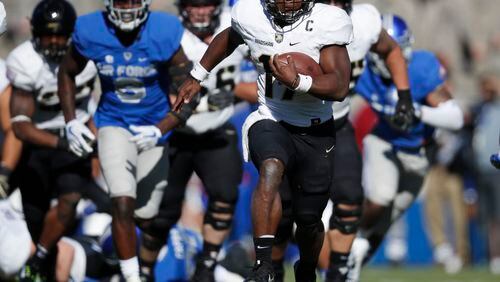If Paul Johnson ran the world, every football Saturday would look like the Army-Navy game.
As it is, three of his disciples – true believers in the ways of run-first-second-and-third option football – are playing important games this Saturday. The paterfamilias of this tight-knit little group, his own 2017 season forgettable on the whole, will be trying mightily to catch their acts.
“We’ve got a recruiting weekend. I’m going to try to fit it in around that,” Georgia Tech’s Johnson said. Whether it’s borrowing a few minutes to catch a couple of snaps of Army vs. Navy or calling up the Kennesaw State game that night on his phone (that’s how he watched the previous week), Johnson will find a way.
Head coach at Navy for six seasons before coming to Tech a decade ago, Johnson still feels an emotional pull toward what is one of the most stirring rivalries around.
“(Army-Navy) is a game I love to watch, especially since I got so many guys who both played for me and coached for me that are involved in it,” he said. “I consider myself very fortunate to have had a chance to be a part of it.”
Inevitably, because it is so stubbornly unique in a drop-back world, the Johnson-inspired triple option is a source of puzzlement/irritation to some. Those Tech fans who automatically default to his offense being boring, one-dimensional or otherwise lacking when it’s time to score quickly may want to take up needlepoint for the day. Because in the football realm, it will be raining option pitches Saturday.
Army’s Jeff Monken and Navy’s Ken Niumatalolo are both fruit of the same tree, long-time former assistants to Johnson at multiple stops who both run basically the same thing. The offensive coordinators at both academies also have ties to Johnson. They get together in Philadelphia at 3 p.m. for armed-forces supremacy.
And Saturday night, at Sam Houston State, wherever that is, Kennesaw State’s Brian Bohannon, another Johnson acolyte, will be taking his young program to an FCS quarterfinal game. Just to make the contrast all the clearer, it’s Bohannon’s triple-option team, the FCS rushing leader, vs. that division’s leading passer.
It is Johnson alone among them – after a 5-6 season – who is shut out of the postseason this time. Both Army and Navy have bowl games pending.
Of course, they keep close tabs on each other, like good brothers should.
“We support each other,” Bohannon said.
“I’m really proud of them,” Johnson said. “I’ve seen those guys basically grow up and become very successful. All those guys started with me very early, right when they started coaching. It has been neat to watch them mature and grow up and go off and do their own things.” Bohannon spent 16 years working under Johnson at Georgia Southern, Navy and Georgia Tech. Monken 15 years at those locations, plus Hawaii. Niumatalolo 13 years at Hawaii and Navy.
They are joined at the statistic: Army, Navy and Tech ranked first, second and fifth in the nation in rushing. All rank a good deal lower in total offense (Navy 33rd, Army 66th, Tech 73rd) and scoring (Army 43rd, Navy 50th, Tech 71st out of 129 teams). Bohannon’s Owls lead FCS in rushing yards per game.
They all add their own wrinkles to the offense, and insist that what they have gleaned from Johnson extends beyond the option.
“It’s about running a program, it’s not all about scheme. It’s about culture and how you go about your business every day. The scheme helps, don’t get me wrong. But, really, it’s a culture thing,” Bohannon said.
Army would be the most radically run-oriented of the bunch. Enjoying a robust 8-3 season, the Black Knights have had five games this season in which they completed not a single pass. And they won four of them. They shut out Air Force, 21-0, without even attempting a pass.
Having attempted an average of nine passes per game, the Midshipmen, by comparison, are a relative Big 12 team.
The Black Knights also are a leading example for how this offense can even the field of play for the service academies, hampered as they are by recruiting limitations. Often smaller in size by regulation and unable to attract the top athletes who balk at the military commitment, the service academies almost have no option but to run the option.
Army succumbed to the temptation to try to modernize the offense at the turn of the millennium, to disastrous results. Todd Berry was 5-35 in four seasons between 2000-03. After a slow start, Monken is 16-8 in the past two seasons at Army, with the first win over Navy in 14 years and the first consecutive bowl appearances since the mid-1980s.
In addition to the physical considerations in going option, there are the strategic ones. Like controlling the ball and shortening the game. When Navy beat Notre Dame in 2016, the Midshipmen played masterful keep-away, limiting the Fighting Irish to six possessions. That was an FBS low since 2008.
And in the end, they figure, why not be different? Be pragmatic, they say. You are not going to compete with the major powers doing the same things they do, only with lesser personnel.
“Everybody wants to throw the ball, and there’s a lot of success with people throwing the ball. But those who run this offense realize it’s successful,” Niumatalolo said.
“Athletic directors want to see the ball in the air, people want to see passing,” the Navy coach said. “I just want to win. I don’t care how you do it, just as long as the ball moves. I always kind of chuckle when I hear, ‘We want to put fans in the seats.’ If you’re losing, you ain’t going to put anybody in the seats.”
Johnson is a decade removed from coaching at a service academy, and further yet removed from the two Division I-AA (now FCS) national titles at Georgia Southern. He’s competing in a Power Five conference now, the ACC, and still running his offense his way. And because it is so different to the eye than anything else going on at that level, Johnson is perpetually on the defensive about his offense.
“You’re forced to be defensive because people talk about it and say a lot of things about it that they know nothing about,” Johnson said. “They have their perception but it’s not usually even close to being right. I think because it’s different you end up being forced to defend it. That’s kind of the way it is.”
Said Monken, a running backs coach at Tech in 2008-09, “Some want (Johnson) to do what everybody else does. But when he does what everybody else does and it doesn’t go Georgia Tech’s way, he’s going to get the same criticism. So, he might as well do what he knows best.”
The few practitioners of this form of triple option believe that, as in the days bygone when the likes of Nebraska and Texas and Oklahoma were running powerful option variations, today’s top teams would roll if they could retool and run such an attack.
“If you had a team running it that is physically superior to the teams they’re playing,” Monken said, “it could be devastating.”
While some elements of the option are widespread, it’s difficult to see the pendulum swinging back in the direction of the totally committed triple option.
In the meantime, let the debate of this offense continue to simmer.
“I look at it like politics,” Johnson said. “The people who voted for the president like him. The people who didn’t vote for him aren’t going to like him, and it doesn’t matter what happens. It’s the same thing. The people who like the offense like it. The people who don’t aren’t going like it and you’re not going to convince them.”
At least on football matters, you know which side of the aisle Johnson resides. Which means, short of having a game himself to play, this is his day.
About the Author







